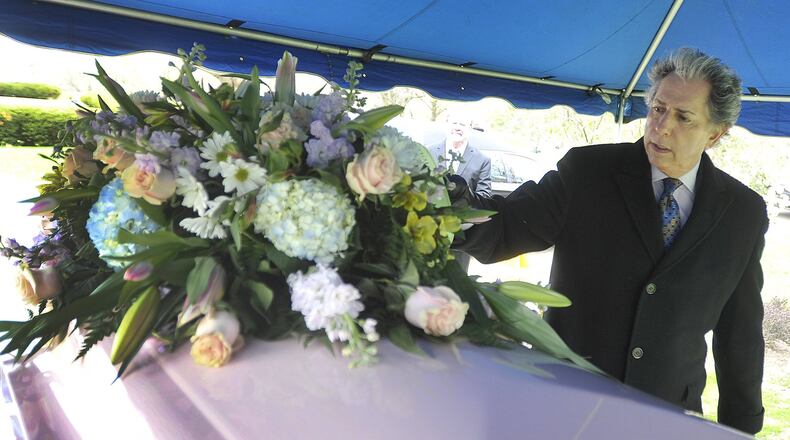Bolinger was like family to many people, but there are no plans for a public viewing or services open to friends because of the crisis, said Andrea Lee, Bolinger’s granddaughter. A graveside service for only immediate family is planned.
Coronavirus: Complete Coverage by the Dayton Daily News
“This is going to be nothing like it typically would have been under normal circumstances,” Lee said. “Normally, we’d have the viewing and have all the family there and friends.”
The death of a family member or close friend already is one of life’s hardest experiences, and coping, mourning and saying goodbye is getting harder because of social distancing, quarantines, size limits on viewings and other changes to bereavement and end-of-life services, funeral directors say.
"COVID is creating problems in my industry we never thought we'd have to deal with," said Larry Glickler, owner of Glickler Funeral Home & Cremation Service. "Not everyone is dying from COVID-19, but everyone is being affected by COVID-19."
Bolinger, 93, of New Carlisle, died on March 19 at Upper Valley Medical Center in Troy while awaiting tests results for COVID-19.
An outbreak at Koester Pavilion and another nursing home in Miami County has sickened dozens and resulted in at least 10 deaths, including Bolinger, according to Miami County Public Health.
MORE: Stimulus checks: Who gets money in Dayton region, and spending advice
Bolinger had two biological grandchildren but “he was a grandfather to all of our friends growing up,” Lee said.
Bolinger will be buried next to his late wife, Zelda, at Glen Haven Memorial Gardens. The service likely will be limited to immediate family, Lee said.
His family wants to celebrate his life, possibly with a family gathering or cookout at one of his favorite parks, Lee said. But they won’t be able to honor Bolinger properly until family members can meet in person safely, she said.
Bolinger’s son, Steven Bolinger, was infected by the virus and remains in the intensive care unit at Miami Valley Hospital. Steven’s wife, Linda, also tested positive for coronavirus but has recovered.
After Earl Bolinger died, his family was in quarantine and couldn’t physically comfort and console each other, Lee said.
“Our grieving — everything — is done by the telephone,” she said.
Bolinger is survived by his son and his son’s wife, two grandchildren, 13 great-grandchildren and seven great-great grandchildren.
Lee said her father, sister and other relatives can’t get closure because they can’t grieve, say farewell and celebrate his life in the normal ways, like they did when her grandmother died.
“It’s not the same, it’s not what it should be,” she said.
Lee said her relatives are taking the coronavirus danger extremely seriously because of how hard it has hit her family.
Funeral homes across the region and state have changed how they operate in light of the pandemic.
Funeral directors are working to ensure families, guests and staff are safe, and right now, that requires temporarily holding smaller or private services, said Gary Burr, president of the Ohio Funeral Directors Association.
But there’s an emotional cost to scaled-down funerals, he said, because families are deprived of the community support they need.
Burr predicts families will host events later on when there aren’t the same kinds of restrictions and infection concerns.
He also expects some families will struggle with delayed grief.
“I expect in the late summer or fall to have many gatherings to celebrate the lives of those who have died at a very unfortunate time,” he said.
Glickler Funeral Home & Cremation Service in Dayton is holding graveside services only because chapel and church services have been shut down, said Glickler, the owner.
Graveside services have visitor limits, and attendees have to follow social distancing guidelines. At a graveside service Friday for a non-coronavirus related death, a small group of mourners spread out in a circle around a casket, many of them wearing masks.
Glickler Funeral Home serves about 50 to 60 families each month.
Families right now also are worried about their finances because of coronavirus-related economic woes, like growing job losses and unemployment, and more people are paying for cremations for economic reasons, Glickler said.
It’s one of the most distressing times Glickler said he’s experienced in his nearly 40 years owning the funeral home because hugs and physically comforting contact is off limits for grieving families.
MORE: Stimulus checks: Social Security recipients don’t need to file tax returns
Glickler said surviving family members are hurting right now because they can’t honor their loved ones in normal ways, with public viewings and other celebrations of life.
During this crisis, families can have private viewings for up to 10 people, but so far, they are choosing not to do that mainly because they don’t want to have to decide who makes and doesn’t make the cut, Glickler said.
“I had a family the other day say, ‘How in the world could we pick 10 people?’” he said.
About the Author

